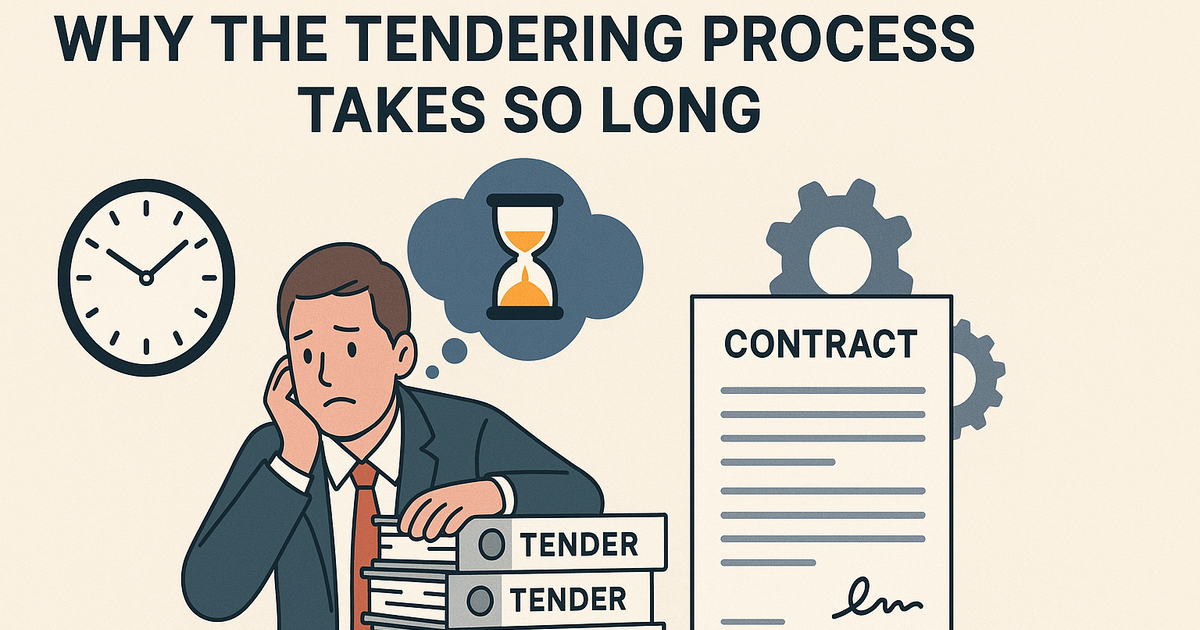Why the Tendering Process Takes So Long (and How to Start)

For many South African businesses, especially small enterprises entering the procurement space for the first time, the tendering process can feel endless. Between compiling stacks of paperwork, waiting for feedback, and trying to interpret compliance requirements, the system can appear intimidating. But once you understand why the process is so long, why so much documentation is required, and how to get started correctly, it becomes far more manageable.
Why the tendering process takes so long
The tendering process isn’t slow by accident. It’s deliberately structured to protect fairness, transparency, and accountability when government and state-owned entities spend public money. Here are the main reasons for the delays:
- Multiple stages of evaluation: Bids are usually assessed in stages: first for compliance, then technical capability, and finally financial value. Each stage is conducted by a separate panel or team, adding weeks or months to the process.
- Volume of submissions: High-value tenders often receive dozens, if not hundreds, of bids. Evaluating each one thoroughly takes time.
- Legal and regulatory compliance: Entities must ensure they follow procurement regulations under the Preferential Procurement Policy Framework Act. Cutting corners could lead to legal disputes or cancelled contracts.
- Public accountability: Because tenders involve taxpayer money, every decision must be justified and auditable. This requires documentation, approvals, and often multiple rounds of sign-off.
Why so much paperwork?
The paperwork might feel excessive, but it serves a critical purpose: proving that your business is legitimate, capable, and compliant. Here are some of the common documents required and why:
- Company registration documents (CIPC): Show that your business is formally registered and legally recognised.
- Tax clearance certificates (SARS): Demonstrate that your business meets its tax obligations.
- B-BBEE certificates or affidavits: Ensure compliance with transformation and empowerment goals.
- Financial statements: Indicate financial stability and ability to deliver on large contracts.
- Track record or references: Provide evidence of past performance and capability.
Failure to provide even one mandatory document can result in automatic disqualification, no matter how strong your bid is. That’s why preparation is everything.
Where to start
If you’re new to tendering, the best approach is to get your foundation right before you begin applying. Here’s a step-by-step starting point:
- Register on the Central Supplier Database (CSD): This is mandatory for doing business with the South African government. Visit the CSD portal to complete your profile.
- Ensure compliance with SARS: Make sure your tax affairs are up to date. A valid tax clearance certificate is often the first item evaluators check.
- Prepare your B-BBEE documents: Depending on your business size, this may be a full certificate or a sworn affidavit.
- Create a tender-ready file: Keep digital and physical copies of all recurring documents (ID copies, proof of address, company registration, tax, B-BBEE, financials, bank letters) so you don’t scramble each time a tender is published.
- Read every tender document carefully: Requirements change per bid. Go through the tender line by line and tick off each requirement before submission.
- Leverage Fetch Tenders: Instead of hunting through government websites daily, sign up for free tender notifications and receive opportunities straight to your inbox.
Final thoughts
The tendering process is long and paperwork-heavy, but that’s by design. It ensures fairness, prevents fraud, and upholds transparency. By organising your documentation, understanding the compliance requirements, and preparing ahead of time, you’ll save yourself frustration and give your business a far stronger chance of success.
